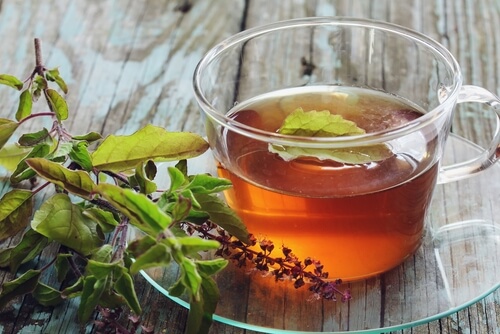5 Reasons Why you Should Include Tulsi in your Daily Tea

Tulsi, the herb that goes by many names, “Holy Basil”, “Elixir of Life”, “The Incomparable One”, or simply tulsi, is the emperor of medicinal herbs. It has long been used in India as a cure all type medicine, capable of treating a wide range of ailments. According to naturopathic doctrine, every part of this plant, from the leaf to the seeds, is usable and possess some type of medicinal benefit. You can use the flowers to treat bronchitis, the leaves to treat malaria, or refine the entire plant into a pill and use it to treat eczema.
If you do not want to expend the effort to figure out all the Ayurvedic uses of this herb you can still benefit from it. Simply add the plant to your tea and passively reap the benefits. To make the tea, just take a few leaves (either fresh or dry) and pour hot water over them. Let the leaves be immersed for 20 minutes then enjoy. Regularly consuming tulsi tea can benefit your body in myriad ways:
Treat Wounds
Tulsi has often been used to treat wounds. It acts as both a disinfectant due to its innate antibacterial, antiviral, anti-inflammatory, and antifungal properties, but it is also known to boost your recovery speed. So, it heals and protects your wounds simultaneously.
Lower Blood Sugar
This herb is also fantastic for type 2 diabetics or people suffering from prediabetes. Every part of the plant is capable of reducing the blood sugar levels in your body.
Lower Cholesterol
This plant is the Elixir of Life for a reason; it has the ability to specifically target metabolic stress and can help you achieve weight loss and lower harmful LDL cholesterol levels.
Ease Pain
Tulsi even acts as an analgesic – pain killer, and can reduce the pain you’re suffering from. This is especially good for people suffering from chronic pain like arthritis or gout.
Protect the Stomach
Drinking tulsi is also a great way to achieve a true iron stomach because tulsi can increase the stomach’s defenses by decreasing the stomach acid levels, and increasing mucus secretion in the stomach.

